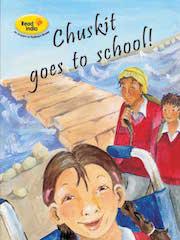
For children afflicted with a physical handicap, life can be pretty difficult—whether in urban or in rural areas. The country offers very little facilities to enable such children to access schools that their non-disabled peers attend. Enabling these children is not difficult, all the schools need to provide are ramps and suitable toilets—but sadly, the will is missing.
Even worse is the fact that in India, inclusive stories about children with disabilities are missing. How can we then expect the non-disabled children to empathise with them, to accept them as their peers, equal in every which way, except in the ability to move around freely?
Hence, it was such a treat to see this simple yet moving story—a winner on all counts. Firstly, because it is set in Ladakh. Through very few sentences, the author successfully gives us a glimpse of life in that beautiful, yet difficult terrain. Secondly, because she has so succintly captured the yearning that a disabled child has of wanting to be part of the mainstream. And most important, as to how with a little bit of sensitivity and caring, one can work wonders.
When Abdul, a friend, realizes that Chuskit is eager to go to school, he approaches the school headmaster, who agrees to his plan to engage all the school children to contribute their mite to make a difference, one that would change Chuskit’s life forever.